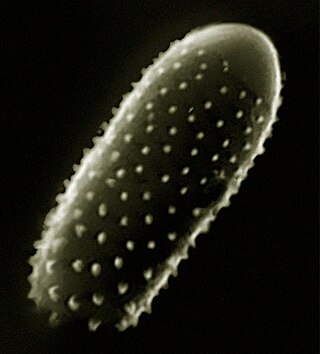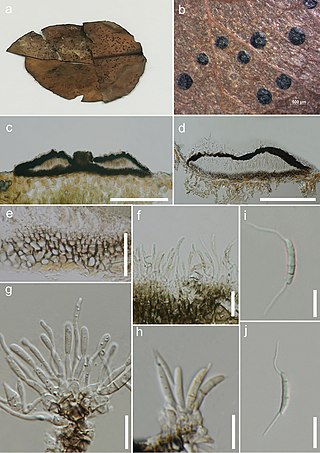Related Research Articles

Phyllosticta is a genus of fungi. Many of the species in this genus are common and important plant pathogens. They typically infect the foliage and cause tannish-gray leaf spots with dark brown to purple borders. However, Phyllosticta may also infect fruit and stems. Yield loss is a common consequence of Phyllosticta infection.

Guignardia is a genus of fungi in the family Botryosphaeriaceae.

Leptosphaeria is a genus of fungi in the family Phaeosphaeriaceae.
Ophiobolus is a genus of fungi in the family Phaeosphaeriaceae.

Venturia is a genus of fungi in the family Venturiaceae. First identified in 1882, species in the genus are plant pathogens. Venturia is widespread and the genus contains an estimated 58 species, or 130 species. Anamorphs were historically represented in the genus Fusicladium.
Fusicladium is a genus of fungus in the family Venturiaceae. Specimens of Fusicladium may be found across the world. Many species are plant pathogens, infecting at least 52 plant genera including apple trees, pea plants, and peach trees. These infectious species are each often host-specific, meaning they can only survive on specific species of plant.

Melampsora is a genus of Basidiomycota fungi. Melampsora species are plant pathogens.

Pestalotiopsis is a genus of ascomycete fungi in the Sporocadaceae family.
In the 10th edition of Systema Naturae, Carl Linnaeus classified the arthropods, including insects, arachnids and crustaceans, among his class "Insecta". Butterflies and moths were brought together under the name Lepidoptera. Linnaeus divided the group into three genera – Papilio, Sphinx and Phalaena. The first two, together with the seven subdivisions of the third, are now used as the basis for nine superfamily names: Papilionoidea, Sphingoidea, Bombycoidea, Noctuoidea, Geometroidea, Tortricoidea, Pyraloidea, Tineoidea and Alucitoidea.
In the 10th edition of Systema Naturae, Carl Linnaeus classified the arthropods, including insects, arachnids and crustaceans, among his class "Insecta". True bugs and thrips were brought together under the name Hemiptera.
Aplosporella is a genus of fungi in the family Botryosphaeriaceae. There are about 225, or 277 species.
Dothiorella is a genus of fungi in the family Botryosphaeriaceae. There are 3 subgenera and approximately 322 species.

Diplodia is a genus of anamorphic fungi in the family Botryosphaeriaceae.

Macrophoma is a genus of anamorphic fungi in the family Botryosphaeriaceae. Some of these species are pathogenic, for example M. musae is a banana fungus.
Zignoëlla is a genus of fungi within the Chaetosphaeriaceae family.
Tenuipalpus is genus of mites in the family Tenuipalpidae, containing the following species:

Discosia is a genus of plant pathogens in the family Sporocadaceae.
References
- Öfversigt af Konglelige Vetenskaps-Akademiens Förhandlingar41(9): 163